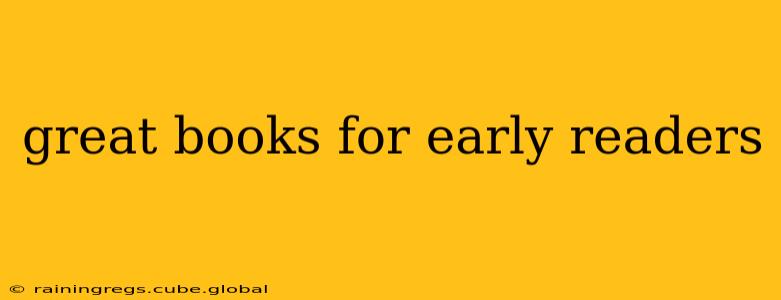Choosing the right books for early readers is crucial in nurturing a lifelong love of literature. Finding books that are engaging, age-appropriate, and encourage a child's developing reading skills can be challenging. This guide provides a curated list of fantastic books for early readers, categorized for easier selection, and addresses common parental queries.
What Makes a Great Book for Early Readers?
Before diving into specific titles, let's define what makes a book ideal for young readers. Key factors include:
- Short, simple sentences: Easy-to-decipher sentences build confidence and fluency.
- Repetitive phrases: These help children predict words and build vocabulary.
- Large, clear font: Makes reading less daunting and improves comprehension.
- Engaging illustrations: Pictures support understanding and keep children interested.
- Compelling storyline: Even simple stories need a narrative arc to captivate young minds.
- Age-appropriate themes: Stories should relate to children's experiences and interests.
Great Books for Beginning Readers (Ages 4-6)
This category focuses on books with simple vocabulary, repetitive phrases, and engaging illustrations to build foundational reading skills.
- "The Very Hungry Caterpillar" by Eric Carle: This classic is perfect for introducing concepts like sequencing and days of the week. The vibrant illustrations are incredibly engaging.
- "Brown Bear, Brown Bear, What Do You See?" by Bill Martin Jr. and Eric Carle: The repetitive structure and charming animals make this a favorite for interactive reading.
- "Click, Clack, Moo: Cows That Type" by Doreen Cronin: This humorous story with relatable characters will appeal to children who enjoy animal tales.
- "Corduroy" by Don Freeman: A heartwarming story about a teddy bear looking for his missing button, this book explores themes of self-acceptance and friendship.
- "Dear Zoo" by Rod Campbell: The lift-the-flap element adds an interactive dimension, making the reading experience more fun.
Stepping Up: Books for Emerging Readers (Ages 6-8)
These books introduce slightly more complex vocabulary and sentence structures, while maintaining engaging narratives and illustrations.
- "Frog and Toad Are Friends" by Arnold Lobel: These charming stories showcase the importance of friendship and offer gentle humor.
- "Matilda" by Roald Dahl (adapted for early readers): While the original is longer, adapted versions exist for younger readers, introducing them to Dahl's whimsical world.
- "Charlotte's Web" by E.B. White (adapted for early readers): Similar to Matilda, adapted versions of this classic are available for early readers, fostering a love for longer narratives.
- "The Magic Tree House" series by Mary Pope Osborne (early readers series): This series introduces children to different historical periods and cultures in an exciting way.
- "Junie B. Jones" series by Barbara Park: These funny and relatable stories appeal to children who enjoy humor and slightly longer chapter books.
What are some popular series for early readers?
Many series are designed specifically for early readers, offering familiar characters and consistent reading levels. This provides a sense of accomplishment and encourages continued reading. Examples include the "Elephant and Piggy" series by Mo Willems, the "Mercy Watson" series by Kate DiCamillo, and the "Nate the Great" mysteries by Marjorie Weinman Sharmat. These series often introduce new vocabulary gradually, making the reading experience less overwhelming.
How can I help my child choose books they will enjoy?
Take your child to the library or bookstore and let them browse. Ask them what interests them – animals, dinosaurs, superheroes, or something else? Let them choose books with pictures that appeal to them. Read aloud together regularly, even after your child can read independently. This fosters a love of reading and helps improve vocabulary.
What if my child struggles with reading?
If your child is struggling, don't pressure them. Focus on making reading fun and engaging. Try different types of books and reading activities. Consider seeking help from a teacher or librarian, or even a reading specialist if necessary. Remember, patience and encouragement are key. Celebrating small successes will build confidence.
By carefully selecting books that align with your child's reading level and interests, you can create a positive and enjoyable reading experience that will last a lifetime. Remember to make it fun, and enjoy the journey of discovery together!
